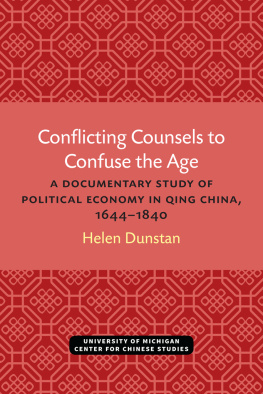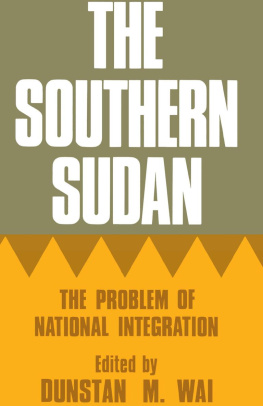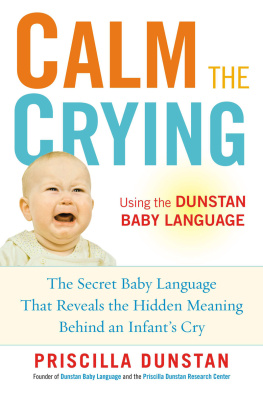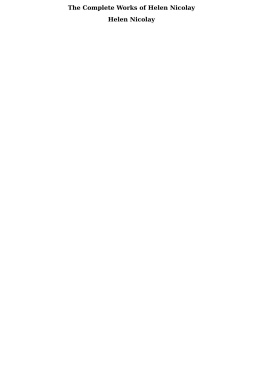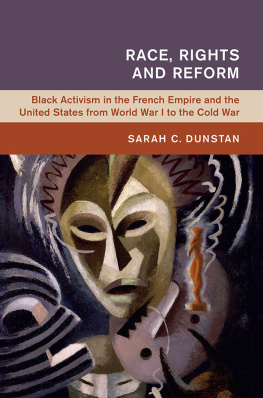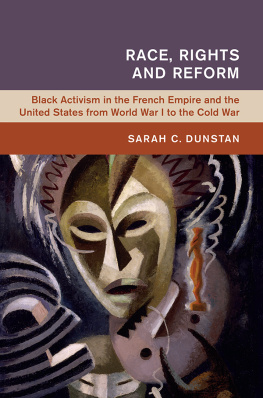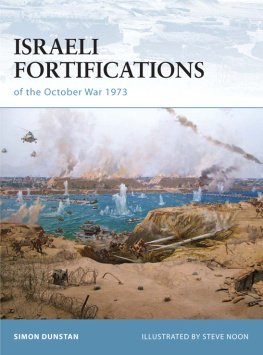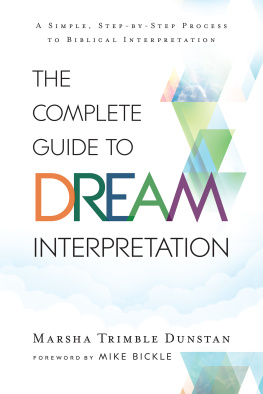Helen Dunstan - Conflicting Counsels to Confuse the Age
Here you can read online Helen Dunstan - Conflicting Counsels to Confuse the Age full text of the book (entire story) in english for free. Download pdf and epub, get meaning, cover and reviews about this ebook. year: 2020, publisher: Kenneth G. Lieberthal and Richard H. Rogel Center for Chinese Studies, genre: Romance novel. Description of the work, (preface) as well as reviews are available. Best literature library LitArk.com created for fans of good reading and offers a wide selection of genres:
Romance novel
Science fiction
Adventure
Detective
Science
History
Home and family
Prose
Art
Politics
Computer
Non-fiction
Religion
Business
Children
Humor
Choose a favorite category and find really read worthwhile books. Enjoy immersion in the world of imagination, feel the emotions of the characters or learn something new for yourself, make an fascinating discovery.
- Book:Conflicting Counsels to Confuse the Age
- Author:
- Publisher:Kenneth G. Lieberthal and Richard H. Rogel Center for Chinese Studies
- Genre:
- Year:2020
- Rating:3 / 5
- Favourites:Add to favourites
- Your mark:
- 60
- 1
- 2
- 3
- 4
- 5
Conflicting Counsels to Confuse the Age: summary, description and annotation
We offer to read an annotation, description, summary or preface (depends on what the author of the book "Conflicting Counsels to Confuse the Age" wrote himself). If you haven't found the necessary information about the book — write in the comments, we will try to find it.
Conflicting Counsels to Confuse the Age — read online for free the complete book (whole text) full work
Below is the text of the book, divided by pages. System saving the place of the last page read, allows you to conveniently read the book "Conflicting Counsels to Confuse the Age" online for free, without having to search again every time where you left off. Put a bookmark, and you can go to the page where you finished reading at any time.
Font size:
Interval:
Bookmark:

Conflicting Counsels to Confuse the Age
A Documentary Study of Political Economy in Qing China, 16441840
Helen Dunstan
CENTER FOR CHINESE STUDIES
THE UNIVERSITY OF MICHIGAN
ANN ARBOR
Open access edition funded by the National Endowment for the Humanities/Andrew W. Mellon Foundation Humanities Open Book Program.
MICHIGAN MONOGRAPHS IN CHINESE STUDIES
ISSN 10819053
SERIES ESTABLISHED 1968
VOLUME 73
Published by Center for Chinese Studies
The University of Michigan
Ann Arbor, Michigan 481091290
First Edition 1996
1996 Center for Chinese Studies
The University of Michigan
Printed and made in the United States of America
 The paper used in this publication meets the minimum requirements of the American National Standard for Information SciencesPermanence of Paper for Publications and Documents in Libraries and Archives ANSI/NISO/Z39.481992.
The paper used in this publication meets the minimum requirements of the American National Standard for Information SciencesPermanence of Paper for Publications and Documents in Libraries and Archives ANSI/NISO/Z39.481992.
Library of Congress Cataloging-in-Publication Data
Dunstan, Helen.
Conflicting counsels to confuse the age : a documentary study of political economy in Qing China, 16441840 / by Helen Dunstan.
p. cm.
(Michigan monographs in Chinese studies, ISSN 10819053 ; v. 73) Includes bibliographical references and index.
ISBN 0-89264-115-0 (alk. paper)
1. ChinaEconomic policy16441912.
2. ChinaPolitics and government16441912.
3. ChinaHistoryChing dynasty, 16441912.
I. Title. II. Series.
HC427.7.D86 1996
338.951dc20 9546073
CIP
ISBN 978-0-89264-115-4 (hardcover)
ISBN 978-0-472-03807-7 (paper)
ISBN 978-0-472-12751-1 (ebook)
ISBN 978-0-472-90146-3 (open access)
The text of this book is licensed under a Creative Commons Attribution-NonCommercial-NoDerivatives 4.0 International License: https://creativecommons.org/licenses/by-nc-nd/4.0/
Contents
This documentary study of late imperial Chinese political economy is a by-product partly of my research for a forthcoming monograph on state policy towards the grain trade and the problem of popular subsistence in mid-eighteenth century China; and partly of my preliminary reading for a broader project on the evolution of economic thought in China, from the eleventh century till the early nineteenth. The present book is a contribution to the study of Sino-Manchu political economy in the heyday of the Qing (Ching) dynasty (16441911). It has two purposes.
The first purpose is to share close readings of important sources with the scholarly community. By the rules of contemporary academic life, analysis is almost all. Sources become invisible, relegated to footnotes which consist increasingly of numbers. Sources are passive; they exist, it would appear, to have their richer parts gouged out, or else to serve as silent witness to the justice of an argument. We remember those whose interesting fragments have been drafted into someones book; the others lose their individuality. Sourcebooks are for undergraduates, to give them insight into the historians craft. For professionals, it is enough to be told where one could check the accuracy of what the analyst has claimed, in the statistically improbable event that any given reader had the motivation, opportunity, and linguistic competence to do so. The result is that, outside most scholars narrow area of expertise, all knowledge becomes abstract and uncertain. One reads the monograph, understands its argument, but has no lively comprehension of the subject.
In intending the present collection partly for my fellow specialists in Chinese studies, including Qing historians, I wish neither to impugn their linguistic competence nor to deny the interest and importance of analytical monographs. The book is offered partly to people who could well have read the material in the original, had they not been reading something else. More broadly, it is for anyone who likes to pick a book up and learn something from it. Here are its selling points. First, it offers an opportunity to watch Qing officials and others thinking through problems of political economy within the constraints of certain genres. Second, it shows them proposing a range of interesting approaches to the problems of their day. Third, it makes accessible some writings in political economy which are difficult because of their literary form or style. Fourth, it presents the full text of several edicts by (or at least, in the name of) the great high priest of Qing political economy, the Qianlong emperor (r. 173596); these have the same sort of importance, as historical documents, as public addresses by the more influential presidents of the United States.
Fifth, the book invites the reader to observe how Qing officials developed arguments on matters of political economy, with the objective of persuading colleagues or superiors. This aspect is important and merits a few words of comment. Many of the documents from which historians of Qing China routinely draw evidence are rhetorical (that is, their aim is to persuade). This means that the information they present is suspect. It is improper to use it without due attention to its authors purpose in including it, and without grasping the rhetorical structure of the text as a whole. Besides, when written communications are politically charged, there can be a substantial gap between the surface meaning of the words and what the author really had in mind. Presenting, uncut (or with a minimum of cutting), some pieces of Qing rhetoric may help to induce greater sensitivity to the nature of Qing bureaucratic documents.
Finally, of course, it is impossible to translate without interpreting, at least to some extent. For better or for worse, this book presents my interpretations of the documents I have translated.
The second purpose of this book is to make a novel contribution to the study of that topic of perennial interest for scholars, the role of the Chinese (or Sino-barbarian) imperial state in the economy.translation of important texts, the present work focusses on areas of tension and controversy in (mainly) eighteenth-century approaches to that central project of Confucian paternalist administration, nourishing the people (yangmin). More exactly, it seeks to establish that there was an antithesis between belief in the activist approach those words imply, and the opinion that, in certain vital matters, it was better for the state to stand aside, and leave societys own economic institutions, trade in particular, to handle things. The case for non-intervention was sometimes based on argument that, in the matter in hand, what we should call a price or market mechanism would spontaneously function to attain the desired outcome. Although the present work attempts to represent both sides of the antithesis fairly, the materials which should be of greatest interest to Qing specialists are those which build some kind of market mechanism argument, however fragmentary.
The idea that belief in market mechanisms played a role in Qing public policy determination is less new now than it would have been ten or fifteen years ago.levels of market awareness: on one hand, mere consciousness that (as we should say) the Chinese economy was commercialized (more or less, according to region), and that commerce played a varying but vital role; on the other hand, specific insights into how the market worked, and an opinion, resting on these insights, that its operation could be trusted.
Finally, it is necessary to distinguish between different kinds of market-oriented policy approaches. To attempt to influence grain prices by selling state reserves of grain was interventionist, although less crudely so than the conventionally repudiated policy of imposing price ceilings. Belief in the redistributive functions of private commerce, meanwhile, could inspire either interventionist or liberal policies. The concept of economic liberalism can be fruitfully applied to analysis of late traditional Chinese political economy. However, its applicability will not be securely established until scholars restrict its use to cases in which advocacy of non-intervention demonstrably rested on at least a rudimentary argument of the sufficiently beneficial working of a market mechanism.
Font size:
Interval:
Bookmark:
Similar books «Conflicting Counsels to Confuse the Age»
Look at similar books to Conflicting Counsels to Confuse the Age. We have selected literature similar in name and meaning in the hope of providing readers with more options to find new, interesting, not yet read works.
Discussion, reviews of the book Conflicting Counsels to Confuse the Age and just readers' own opinions. Leave your comments, write what you think about the work, its meaning or the main characters. Specify what exactly you liked and what you didn't like, and why you think so.

